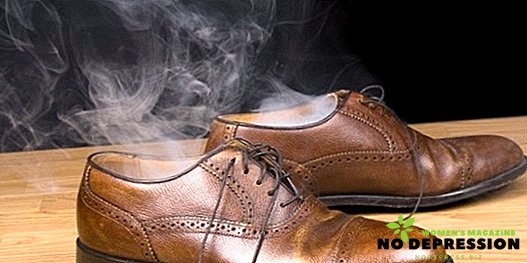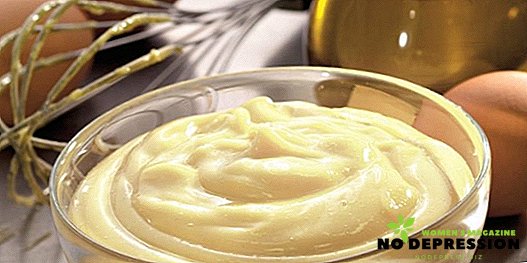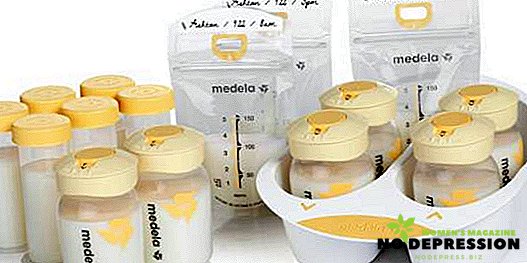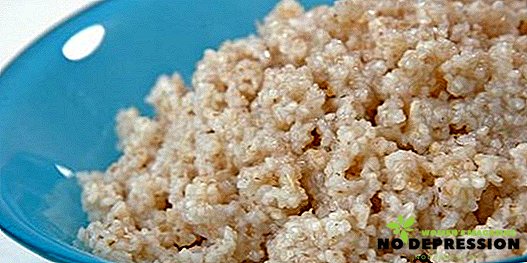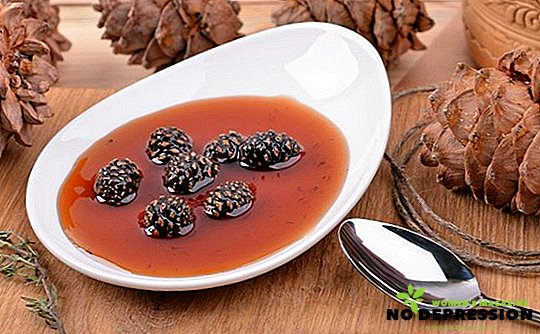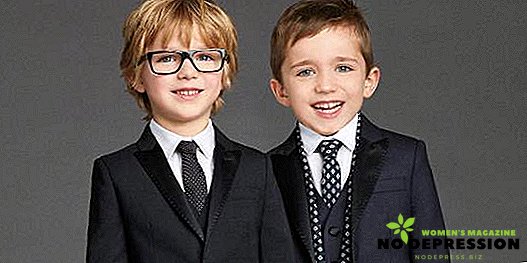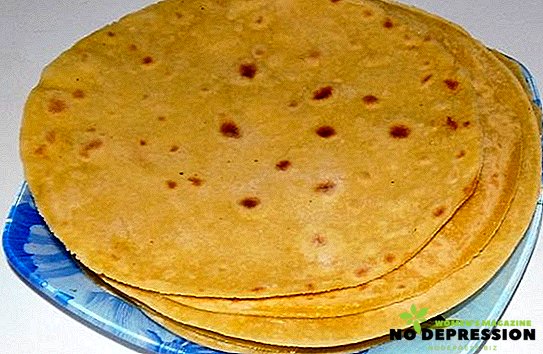Cough is one of the most common symptoms of illness in children. Causes of coughing can be infectious, catarrhal, or allergic.
Allergic cough occurs against the background of the body's reaction to the ingress of any allergen into the upper respiratory tract, accompanied by such complications as edema of the nasal mucus, throat, and bronchi.
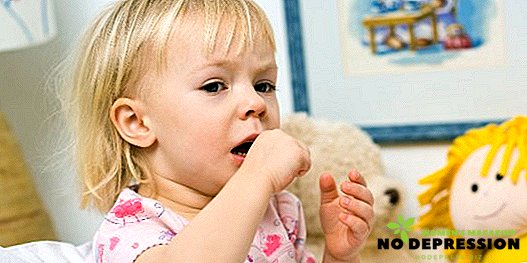
Causes in children allergic cough
The cause provoking an allergic cough in a child, is the ingestion of an allergen.
Microscopic elements entering into dissonance with the child’s immune system enter the blood, settle on the mucous membrane of the upper respiratory tract and cause reflex tremors aimed at ridding the respiratory tract of foreign elements.
 Allergen at the same time can be any component of plant, animal or chemical origin. The most common allergy-causing substances are:
Allergen at the same time can be any component of plant, animal or chemical origin. The most common allergy-causing substances are:
- in pollen of flowering plants;
- in animal fur;
- in cosmetics;
- in household chemicals;
- in medicines;
- in food dyes;
- in the composition of paints, varnishes;
- in household dust.
Allergen can be in feather pillows, old mattresses and blankets. Allergies can cause mold spores, fungal spores, hay. Among food products, allergies are most often caused by:
- citrus;
- cow milk protein;
- eggs;
- peanut;
- honey;
- Strawberry;
- spice.
Among flowering plants whose pollen causes allergies are leading:
- trees: birch; poplar; maple; alder; elm; Rowan;
- shrubs: jasmine, lilac, elderberry, privet;
- herbaceous plants: wheat, oats, weeds;
- ornamental plants: petunias, asters, chrysanthemums, marigolds, chamomiles;
- indoor plants: geranium, ferns of different species, spurge, Kalanchoe.
Houseplants cause allergic reactions not only by their pollen, but also by the secreted essential oils and spores of the fungi that live on these plants.
Different age categories of children are often susceptible to common types of allergens.
So, among newborn babies, atopic dermatitis is most common, children under 6 years are more likely to be allergic to foods and chemical ingredients that are part of cleaning and cosmetic products.
Allergic reactions of school-age children are dominated by allergic reactions to pollen, animal dander, and dust.
Symptoms of allergic cough
If parents have not yet experienced allergies in their child, then quite often an allergic cough is taken as the symptoms of a cold or a viral illness.
 Allergic cough can last for quite a long time, it can not be mitigated by conventional home remedies for cough, such as hot milk with honey.
Allergic cough can last for quite a long time, it can not be mitigated by conventional home remedies for cough, such as hot milk with honey.
If a cough is a manifestation of an allergic reaction, then medical antitussive drugs do not help to get rid of such a cough.
A cough that occurs on the background of allergic reactions is very strong, sometimes has the character of debilitating seizures, the child tries to cough and can not.
The following manifestations are observed:
- dry allergy cough;
- sputum is almost absent;
- there is a feeling of lack of air;
- no other signs of colds are observed;
- cough-like seizures increase in certain circumstances — when an animal approaches or with a certain odor;
- Seasonal exacerbation of cough may occur with allergies to herbal ingredients.
In addition to attacks of cough, allergic reactions are accompanied by other pronounced indicators:
- redness of the eyeball;
- swelling of the face;
- profuse tearing;
- clear discharge from the nose;
- swelling of the larynx, sinuses, other organs;
- redness and itching of the larynx.
What is the difference between allergic cough and cough accompanying other diseases?
Since cough is accompanied by many childhood diseases, great attention should be paid to all the symptoms. How to distinguish an allergic cough in a child from other diseases? Allergic cough does not pass when treated with antibiotics and antitussive drugs and is not accompanied by other manifestations of colds:
- no temperature increase occurs;
- no chills;
- sputum is either absent altogether, or happens in insignificant volumes, sputum is colorless, viscous, without admixture of purulent discharge;
- the cough is aggravated by any recurring events — by taking certain foods, by contact with animals, by walking near flowering plants.
An allergic cough may be seasonal, especially if it is allergic to pollen of flowering plants. At night, it is usually worse, accompanied by signs of suffocation, lack of air.
Treatment of allergic cough in a child
How to treat an allergic cough in a child is a matter of concern to many parents. Allergic cough is not an independent disease, it should be treated with an integrated approach, for this you need:
- if possible, remove the source causing the allergy;
- start using antihistamine medications;
- start a set of measures for the general strengthening of immunity;
 One of the most necessary therapeutic measures are preventive measures to eliminate allergic reactions.
One of the most necessary therapeutic measures are preventive measures to eliminate allergic reactions.
If the allergen was able to identify and correctly identify the source of irritation, it is necessary to immediately eliminate this source, or at least limit contacting the child with a potential allergen.
With the manifestation of allergic symptoms, it is necessary to stop antihistamines.
For the overall strengthening of the child’s immune system, a complex of tempering procedures is needed, such as:
- walks in the open air;
- use of a contrast shower;
- proper nutrition;
- compliance with the regime;
- strengthening morning exercises;
- taking vitamin preparations.
Active games in the fresh air, adherence to the daily routine, tempering procedures will help strengthen the child's body, which will allow his immune system to resist harmful damaging effects, in turn, this will significantly reduce the manifestations of allergic reactions.
If the parents suspect the child of allergies, it is necessary as soon as possible to show it to a specialist. The doctor will help you determine the specific forks of the irritating allergen and prescribe the necessary treatment. Allergies must be treated, as this disease can provoke the development of other, more serious diseases.

How to remove an attack of allergic cough
Attacks of suffocative strong cough are relieved by the use of antihistamines. They quickly and effectively stop an attack, relieve swelling, relieve the child from choking. The most effective drugs:
- suprastin;
- tavegil;
- diazolin;
- claritin;
- zyrtec;
- loratadine.
 Modern antihistamines are available in the form of tablets and inhalations, which is especially convenient for eliminating coughing episodes in young children. The use of inhaled antihistamines eliminates the attack in 15-20 minutes.
Modern antihistamines are available in the form of tablets and inhalations, which is especially convenient for eliminating coughing episodes in young children. The use of inhaled antihistamines eliminates the attack in 15-20 minutes.
Antihistamines, produced in the form of tablets, will ensure the long-term elimination of allergy symptoms - up to 12 hours. If necessary, the doctor may prescribe the use of hormone therapy.
If the use of antihistamines is currently not possible for any reason, then strong episodes of allergic cough can relieve mustard plasters placed on the breast of a child rubbed with camphor oil.
Treatment of allergic cough folk remedies
Adverse factors affecting the environment, the abundance of chemical components in children's cosmetics, preservatives and dyes used in baby food, all this has led to an increased incidence of allergies.
But the problem of allergies has always existed, since ancient times, people have learned to treat it with folk remedies, without the use of chemical medicines. Allergy treatment with folk remedies consists of natural natural ingredients and has a more gentle effect on the child's body, which is especially important for allergies.
In the treatment of folk remedies include adherence to the diet, the use of baths, tinctures, ointments, created at home according to the recipes of traditional medicine.
 One of the most common anti-allergic herbs are a series, dandelion, burdock. When treating an allergic cough in a child, folk remedies help honey with lemon well: grind unrefined lemon along with the peel, add 2 tbsp. l honey and 4 tbsp. l water, heat it all up, stirring constantly, until smooth, not boiling.
One of the most common anti-allergic herbs are a series, dandelion, burdock. When treating an allergic cough in a child, folk remedies help honey with lemon well: grind unrefined lemon along with the peel, add 2 tbsp. l honey and 4 tbsp. l water, heat it all up, stirring constantly, until smooth, not boiling.
Take a tablespoon 6 times a day. However, it is necessary to use honey in case of allergy with caution, since it is itself included in the list of the most allergenic products.
Well help to remove coughing attacks with allergies and honey in the composition with aloe and Cahors. Washed and dried leaves of aloe are wrapped in cheesecloth and left in the fridge for 7 days. Then the aloe is crushed, mixed with honey and Cahors, added in equal shares. Everything is thoroughly mixed, consumed with meals.
An effective remedy is also considered antitussive drinking from dry bay leaves: crushed bay leaves are poured with boiling water at the rate of 2 tbsp. l 300 ml. boiled water, insist for 30 - 40 minutes, filter, and take the broth.
It helps with an allergic cough in a child and an infusion from the collection of leaves of a mother and stepmother, herbs of oregano and althea root (based on 2 parts of mother and stepmother and althea and 1 part of oregano). A tablespoon of this collection pour a glass of boiling water, filter through an hour, use 2 tbsp. l several times a day.
Safe house for allergic children: getting rid of allergens
In the house where the child is susceptible to allergies, there should be a minimum of dust-collecting things - carpets, carpet paths are removed, feather pillows, feather beds, and old mattresses are ruthlessly thrown away. Books, boxes and figurines are put away in glass cases of cabinets.
 Requires the creation of maximum hypoallergenicity. All plants are removed from the house, pets that have wool are removed. Sometimes even a change of residence is required, for example, in cases where the housing is located near a forest-park zone, and the child is allergic to flowering plants growing in this zone.
Requires the creation of maximum hypoallergenicity. All plants are removed from the house, pets that have wool are removed. Sometimes even a change of residence is required, for example, in cases where the housing is located near a forest-park zone, and the child is allergic to flowering plants growing in this zone.
In the house where the allergic child lives, wet cleaning should be done every day, preferably a washing vacuum cleaner. In such a house is not recommended excessive use of household chemicals, cosmetics, perfumes and aerosols.
Also not recommended the presence of upholstered furniture and long-haired soft toys. If there are still soft toys in the house, then it is recommended to pack them in plastic bags before washing and keep them in the refrigerator. This will help rid the toys of dust mites.
Children’s clothes and bed linen should be washed with hypoallergenic powders; dishes should be washed only with hypoallergenic detergents.
Pillows, blankets and mattresses must be filled with synthetic fillers. It is necessary to ventilate the children's room often.
Allergy prevention
The best prevention of allergic diseases is to harden the child and stimulate its immune system. Besides:
- the child’s room must be clean;
- daily wet cleaning is required;
- do not smoke near the child;
- excessive use of chemical components should be avoided;
- clothes and toys of the child should not contain toxic dyes;
- It should be as little as possible to load the body of the child with antibiotics;
- It is necessary for a child to use vitamin complexes;
- New products should be introduced into the baby ration with caution.
Active games in the fresh air, removal of the source of allergies and strengthening the nervous and immune system of the child significantly reduce the manifestations of allergic reactions. But finally get rid of them will help specialized treatment prescribed by specialists-immunologists.
In the next video there is information on how to distinguish allergic cough from infectious.


